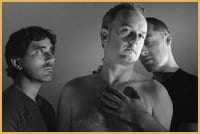Bent, the story of three gay men fighting for survival in Nazi Germany, is “the ultimate coming out story,” says lead actor Sean Cummings.
Cummings plays Max, a depressed drinker and master manipulator who struggles to come out in 1930s Germany.
The play opens with the Night of the Long Knives, an event that heralds the destruction of Berlin as a queer haven and turns Max’s life inside out.
Fuelled by booze and cocaine, Max brings a gay Sturm Abteilung (SA) officer back to the apartment he shares with his boyfriend Rudy. He doesn’t know Hitler has just ordered the execution of all his SA troops.
Max and Rudy end up running for their lives as the Nazis begin rounding up queers, Jews, Poles, gypsies and just about anyone else they see as a threat, or different.
When Martin Sherman’s Bent was originally produced in London’s West End in 1979, it marked the first time the subject of gays during the Holocaust was discussed in the mainstream. That production starred Ian McKellan and since then, it has been produced on Broadway, featuring Richard Gere, and also turned into a movie in 1997 starring Clive Owen.
For Cummings, Bent is as important as Anne Frank in the extensive Holocaust archive.
“These are the real lives of real people who were persecuted for nothing except who they were,” Cummings explains.
Learning about the treatment of queers during the Holocaust “might have helped me coming out,” he adds.
“I remember our teacher, Mr Jeffries, gave us a list of who was rounded up. I remember the gypsies, I remember the Poles. I don’t remember him mentioning homosexuals,” Cummings says.
It all comes down to a lack of education in queer history, he says.
“Why the fuck aren’t they teaching this kind of history?”
A more gay-inclusive curriculum could go a long way towards promoting understanding and open-mindedness today, say Bent’s cast and crew.
Just one week after he read the Bent script, Cummings says he and his friends were walking down the street after clubbing in Victoria when they were accosted by two drunk men. “They called us cocksucking AIDS fuckers,” Cummings recalls.
Joshua Lewis, who plays the sweet-natured and very out Rudy, says it’s too easy to say queers have come a long way.
“Who’s to say that couldn’t happen again?” Lewis asks, pointing out that Berlin in the 1930s “was a huge gay mecca for Europe.”
In contemporary Vancouver, Lewis notes he doesn’t think twice about introducing his partner or saying he’s married. But that doesn’t mean homophobia is not alive and well.
“You don’t know who your enemies are in a state of comfort,” Lewis contends. “Rudy is comfortable and doesn’t think twice. Today people keep it to themselves if they don’t agree with homosexuality. You don’t know who you have to beware of.”
It’s still very recent history, says Bent director Amanda Lockitch, adding that “it’s not time to move on and forget about” how queers were treated during the Holocaust.
Current challenges, like book banning and censorship in schools, “can be quite arbitrary,” easily snowballing into other means of isolating groups of people, Lockitch elaborates. As the Nazis rounded up increasingly various groups, executing, sterilizing and otherwise maiming them, “it became a lot easier to herd off the population,” she maintains.
Lockitch’s production of Bent also explores the issue of the victim-becoming-predator, highlighting her contention that a lot of people “could have been on either side.”
“When does the person holding the gun have it held to him?” Lockitch muses.
It was for this reason she double-cast all the actors, except Cummings.
Ultimately, this is really a love story, says Lockitch.
“It’s about the two great loves in one man’s life.”
Still, says Sebastian Kroon who plays doomed storm trooper Wolf in the first act, Bent is not a “love conquers all” story. Indeed, there is no easy, shiny, happy Hollywood ending.
“Can you love in a situation like this when everything is falling apart around you?” Lewis asks.
Bent’s story shifts significantly when Max and Rudy are on their way to Dachau concentration camp. Initially, Max struggles to stay closeted. Meeting Horst, an out gay man identified by the pink triangle stitched to his prison garb, forces Max to confront his fear of coming out.
In the end, Max has lost everything, says Cummings, but has one more choice to make.
“He can compromise himself and perhaps live another day. Or, he can finally accept himself.”

 Why you can trust Xtra
Why you can trust Xtra


